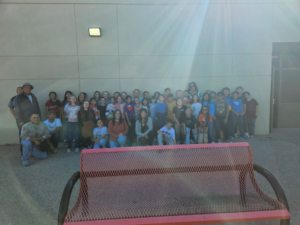Monty Python Might be on to Something

By: Pastor David Grousnick
Thousands of years ago a young Chinese emperor called upon his family’s most trusted advisor. “Oh, learned counselor,” said the emperor, “you have advised my father and grandfather. What is the single most important advice you can give me to rule my country?”
And Confucius replied, “The first thing you must do is to define the problem.”
Many unhappy people cannot put their finger on what is really causing their distress. Many unfulfilled people cannot even tell you what it would take to satisfy them. Many of us have no clear idea or conception what our real needs, our real desires, and our real priorities are.
And because we have never defined the problem or clarified our goals, we spend a lifetime anxiously wandering with very little to show for the pilgrimage.
It is like the beggar in the movie “Monty Python’s Life of Brian.” Brian and his mother are walking through town and get hit up by a beggar. “Alms for an ex-leper. Alms for an ex-leper, please.” And Brian says: “What do you mean an ex-leper?”
And the leper says: “Well I was cured”
“Who cured you?” Brian says.
And the leper says: “That Jesus fellow.” He says: “Now I have a hard time making a living, all I’ve ever known how to do is beg.” And Brian says: “Well why don’t you go back and ask him to make you a leper again?”
And the leper says: “Well, I might not like that. Maybe he could just make me a leper during working hours or something.”
So, Brian just sighs, drops a coin into his cup and walks away. The ex-leper looks in the cup and says: “A half a dinari! Look at this – he only gives me a half a dinari!” And Brian says: “Some people are never satisfied.”
To which the leper replies: “That’s just what Jesus said!”
Now Monty Python might be on to something. Jesus may not have said exactly these words, but he certainly ran into people who were unappreciative. Blind Bartimaeus was not one of them. Upon receiving his sight, he immediately began to follow.
Sometimes in life, you have to define the problem and then decide if you are going to ask for help.
Doctor Fred Collier, a retired physician tells this story about his youth.
He was a medical student in the Army Specialized Training Corps in 1945 when World War II ended. He was from a Kansas family that didn’t have the kind of money he needed to complete medical school on his own. And so, when he mustered out of the army, he had no idea how he’d ever finish school, if indeed he’d ever finish it all.
One day he happened to pick up a copy of a magazine in a barber shop. One of the articles talked about the kindness and compassion of Eleanor Roosevelt, whose husband, President Franklin Roosevelt had died just a few months before.
That article planted a seed in Fred’s mind. He went to the local library and with the help of the librarian found Mrs. Roosevelt’s home address. Then he sat down and composed a letter telling her about his problem. He wrote it and rewrote until he had it exactly the way he wanted it.
When he put the letter in an envelope and dropped it in the mailbox, even his young wife wondered if it was worth the time and the postage he’d spent on it.
To Fred’s amazement, Mrs. Roosevelt agreed to meet him. When the meeting ended, she promised to help him. In the months and years ahead, Fred got checks through Mrs. Roosevelt from a variety of sources, including her own personal checks. Fred, in turn, kept her informed of his progress and sent her copies of all his term papers. Her secretary said later that she always read them with great interest.
Later Mrs. Roosevelt visited the couple in their sparsely furnished apartment. The owner of the apartment nearly collapsed when he recognized the famous visitor.
When Fred finally finished Medical School, he told Mrs. Roosevelt that he didn’t know how he would ever be able to repay her. She said that repayment wasn’t necessary nor desirable. Then she added “I will be adequately repaid if, when you are financially secure someday, you help out someone else who is truly deserving, as you were.”
Doctor Fred Collier defined his problem, reached out for help and he received it. As did blind Bartimaeus (Mark 10:46-52). It is a hard thing to do, this asking, a difficult thing, a humbling thing, but there are times when we all need help, times when we must turn to our parents once again for help, or to our children.
Sometimes it is to the church. Sometimes to God.
Have a great weekend!



